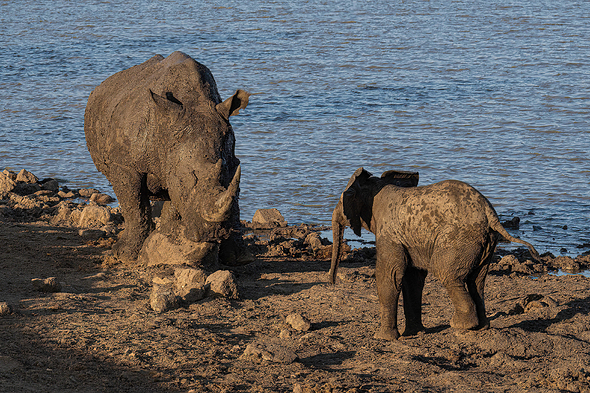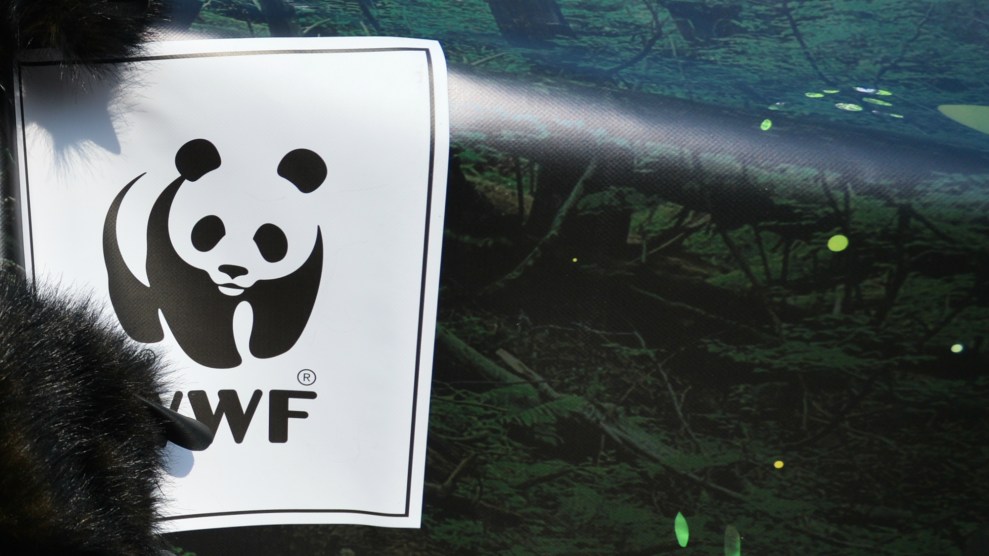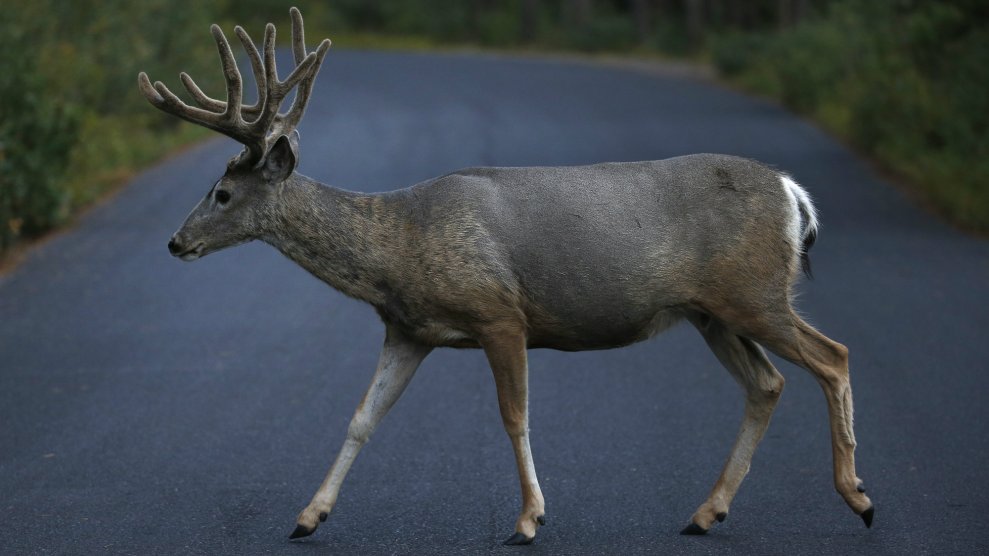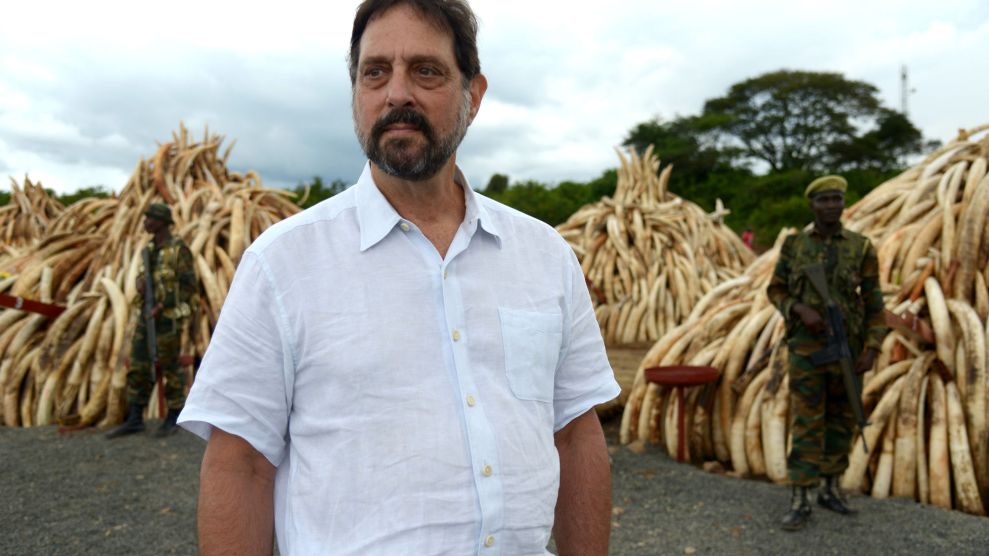
Media Drum World/ZUMA
This story was originally published by Slate‘s Future Tense partnership and is reproduced here as part of the Climate Desk collaboration.
In August 2021, forest range officer Remya Raghavan caught three people carrying wild boar meat in the Wayanad forest of Kerala, a state in southern India. Possessing wild animal meat is a crime under the country’s 1972 Wildlife Protection Act, so Raghavan entered all the details of the crime—location, witnesses, names of the accused, items seized, and section of the forest—in a mobile application. Just like that, the case was officially registered in the app-based system, which signaled that it needed to be taken to court.
The app Raghavan used is called HAWK, or Hostile Activity Watch Kernel, and it appears to be the first such digital intelligence gathering system for wildlife crime in India. It helps officers like Raghavan centralize and share information on forest and wildlife crimes in real time.
The app, and efforts like it, fills a huge need: Global demand for elephant ivory, rhino horns, pangolin scales, live reptiles, and big cats has fueled a poaching crisis across the world. Countries like Botswana, India, Kenya, and South Africa have reported high incidences of poaching, and globally, wildlife trafficking is considered the fourth-largest category of illegal trade, after arms, drugs, and human trafficking. In India, more than 70,000 native and exotic species were trafficked from 2011 to 2020. In South Africa, close to 10,000 rhinos have been poached in the past decade (though poaching incidences have decreased since 2015).
The illegal wildlife trade is a huge threat to the survival of species and endangers biodiversity, the environment, health, and livelihoods. According to the World Health Organization, illegal logging, fishing, and wildlife trade results in a global loss of $7 billion to $12 billion worth of government revenue per year. The loss of wildlife also exacerbates the climate crisis because wildlife helps maintain the forest ecosystem, which acts as a carbon sink. Further, wildlife trafficking could increase the likelihood of future zoonotic epidemics and pandemics.
Technology is key to tackle the illegal wildlife trade, and there are lots of different efforts in that direction—camera traps, drones, and DNA analysis have been used globally, and HAWK sits alongside several similar mobile apps designed to fight or prevent poaching.
In East Africa, the US Agency for International Development launched the Wildlife Information and Landscape Database, which uses GPS to record information on poaching, animal mortality, human-wildlife conflict, and illegal human activity. Similarly, in Kenya, the app-based Spatial Monitoring and Reporting Tool allows rangers to track threats to elephants, which officials say has led to a decline in poaching. Another app is targeted at the aviation industry, allowing airport and airline staff to report suspected trafficking. Even the state of Utah has an app for reporting poaching.
Although these apps have proven helpful in investigating and prosecuting cases, the larger challenge of finding the people funding and orchestrating these crimes, many of whom are part of international crime networks, remains.
HAWK was developed by Manu Satyan, a Kerala district forest officer, and Jose Louies, director of the Wildlife Trust of India, to more efficiently track and reduce the growing incidences of illegal wildlife trade in India. Its roots trace back to 2017, when Louies and Satyan learned about an app-based counter-poaching initiative known as tenBoma, which was created by the International Fund for Animal Welfare to protect Kenyan wildlife. The US military had helped in the project by sharing intelligence-gathering methods used in counterterrorism efforts. The Kenyan app identifies poaching hot spots, and authorities then work with local communities in those hot spots to track poachers and suspicious activities.
Satyan said they recognized that India also needed to develop a database to track habitual offenders who target endangered or trophy animals such as tigers, elephants, and other species that have high commercial value. And so they got to work on HAWK. Before the app was rolled out in Kerala in August 2020, Louies and Satyan consulted with the forest staff about their experience fighting wildlife crime—how poachers tend to enter forests, what suspicious vehicles might look like, and the various challenges for reporting. Once they had a prototype, they asked the forest officers to test it.
Pranesh Prakash, co-founder of the Centre for Internet and Society, an India-based nonprofit that researches digital privacy, said it’s well known in criminology that a small percentage of people commit a significant percentage of crime, so apps like HAWK seem to be a good step. “But where there is documentation, especially of crime, the question arises of how the data will be used and who it will be available to, and for how long it will be stored,” he said in a message. Digital surveillance disproportionately affects low-income populations, and studies have shown that poverty and lack of economic opportunities are the main drivers of poaching. And although apps can track the people participating in poaching on the ground, it’s much harder to track the people behind them, those who are ultimately profiting.
Because the illegal wildlife trade is run by organized criminal networks, intelligence is crucial to curtail illegal trade or apprehend people engaged in it across state and international borders. In developing the app, Satyan and Louies connected with two US military intelligence analysts who briefed them on the rules and methods for developing an intelligence gathering and processing system. “One concept that came from them is assessing the threat level of a habitual offender,” Louies said.
HAWK profiles suspected habitual offenders through interviews and other data gathering, which allow officers to register age, health, financial situation, current activity, and travel patterns. The system assigns a threat level from 1 to 10 and predicts the possibility the suspect will engage in criminal activity. If a habitual offender is very active, in good health, and in need of money, he may be put on a threat level of 8 or 9.
HAWK also has separate databases on animal deaths and unregistered or suspicious vehicles entering forest areas. The system hopes to use the data on habitual offenders and their threat level, along with their expertise in animals (each poacher usually specializes in one type of animal), and correlate it with suspicious activity, such as animal injuries or the presence of snares or traps in the forest. Ultimately, the goal is to predict potential crimes. “The entire concept of HAWK is not to catch people when they commit a crime, but to prevent crime from happening,” Louies said.
Applied to other contexts, these sorts of tactics have generated controversy, and Andrew Ferguson, a law professor and the author of the book The Rise in Big Data Policing, said predictive policing has largely failed in the US. “However, the geographic limits, unusual movements, and specific triggers and patterns of poaching and wildlife crime might be more predictable than most crimes,” he said in an email. “Also, the number of suspects is rather small, and the resale market limited, so tracking the patterns makes a good bit more sense than other crimes.”
The app isn’t able to make predictions yet, because it doesn’t have enough data—but it hopes to be able to do so within two years. For now, field staff in Kerala uses the app to enter data when it encounters a crime, and HAWK then generates the documents an officer needs to print out and submit the crime in court. Since the system’s rollout in Kerala in August 2020, HAWK’s documentation process has streamlined investigations that were once “a mess,” said Aneesh Joseph, an assistant prosecutor at the High Court of Kerala. The previous system required officers to manually fill out the documents, a process that was prone to errors, manipulation, and missing data, and often led to delays in registering the crime, allowing the accused to get off scot-free, Satyan said. Once a case has been registered through the app, it can’t be manipulated, which is beneficial to both the prosecutor and the accused, Joseph said.
The court proceedings—such as witnesses’ depositions, trial date, and investigation history—are also captured in the HAWK system, and all government witnesses are given a temporary login so they can see the case history. “The process is transparent; any officer can see what is happening, and mistakes are reduced,” Satyan said. Before the new documentation system, there were instances of a crime location’s being incorrectly recorded, or poaching being erroneously registered as accidental death.
Still, there are challenges: HAWK doesn’t yet have a way to directly interface with court systems. Instead, computer-generated printouts are submitted to court, and only then does the court take on the case. Similarly, if a crime happens in a remote area, it can take several hours, or even a day, to get to an area with internet connectivity good enough to enter the details in the HAWK application, Raghavan said. The interface is better on a computer, so the officers prefer to reach the forest office to enter the details in the desktop system, which can cause further delay.
Prakash, of the Centre for Internet and Society, said tracking and listing repeat offenders in an app is not necessarily harmful by itself. “But the need to track offenders to decrease wildlife crimes needs to be weighed against the right of people to not be constantly surveilled,” he said. “These two countervailing concerns can be addressed by limiting the time that someone is tagged as a target for surveillance, and by restricting the data to only officials who need it.” He added that someone who hasn’t committed a crime in a particular time frame (say, in the past year) should not be subject to heightened surveillance. “Once the personal data has outlived its utility, it should be removed.”
HAWK has now been included in the Kerala forest department’s monthly review—which tracks wildlife deaths, crime reports, and the status of court cases and investigations. This allows the department to better monitor case outcomes. Louies and Satyan, meanwhile, are planning to scale HAWK for use across the entire country. In 2022 HAWK was introduced in the state of Karnataka, and is slated to be implemented this year in two additional states, Uttar Pradesh and Madhya Pradesh. “Once there is a good database from around the country, we can know if a suspect has a prior record elsewhere,” Joseph, the prosecutor, said. “That will be much more effective, as previous conviction warrants a higher penalty.”
Future Tense is a partnership of Slate, New America, and Arizona State University that examines emerging technologies, public policy, and society.















